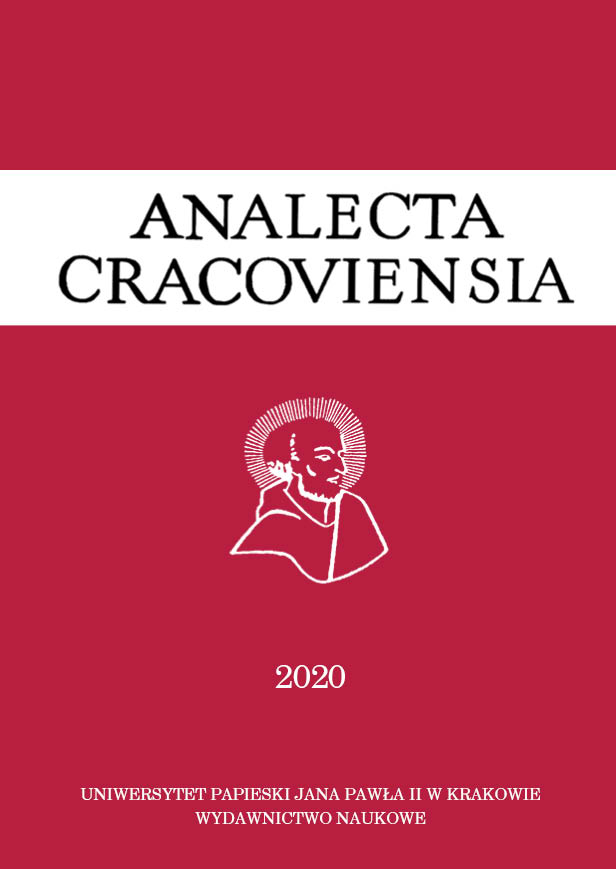Freedom – Truth – Conscience. Anthropological Determinants of Morality in the Encyclical St. John Paul II Veritatis Splendor.
DOI:
https://doi.org/10.15633/acr.4048Keywords:
recognition of the truth, free choice, conscience, ethics, act of personAbstract
Human action is the basis for building existence both in the individual dimension and in all social relations. At the core of every action that a person undertakes there are three essential elements that determine the fact that we are talking about human action, and not just the occurrence of a specific effect as a result of the action of an impersonal cause. These factors, specifically human, deeply rooted in the nature of man as a person, are the ability to know the truth, freedom of choice and the conscience. That is why we can talk about the existential structure of man.
Precisely because human activity is connected with the possibility of knowing the truth, not only the technical one, that describes the world of objects, but also the truth of wisdom, revealing the meaning of things, and the human ability to make autonomous choices, following the axiological criterion (good-evil) that reveals itself apparently in the experience of conscience, man is responsible for his actions. This responsibility has its consequences not only in the moral but also legal dimension.
References
Frossard A., „Nie lękajcie się”. Rozmowy z Janem Pawłem II, Watykan 1982.
Gilson É., Wprowadzenie do nauki Świętego Augustyna, Warszawa 1953.
Ioannes Paulus PP. II, Litterae encyclicae Dominum et Vivificantem (18.05.1986), nr 43, „Acta Apostolicae Sedis” 78 (1986), s. 809–900.
Jan Paweł II, Audiencja generalna Podstawa etyki chrześcijańskiej: związek pomiędzy prawdą a wolnością (13.07. 1983), „L’Osservatore Romano” (wyd. pol.) 4 (1983) nr 7–8, s. 20.
Joannes Paulus PP. II, Litterae encyclicae Veritatis splendor, „Acta Apostolicae Sedis” 85 (1993), s. 1133–1228.
Jan Paweł II, Pierwsza pielgrzymka do Polski (Warszawa, 3.06.1979), Homilia w czasie Mszy św. odprawionej na Placu Zwycięstwa, w: Jan Paweł w Polsce 2–10 czerwca 1979. Przemówienia, reportaże, sprawozdania, Poznań 1982, s. 39–45.
Jan Paweł II, Przemówienie do Zgromadzenia Ogólnego ONZ (5.10.1995), w: Przemówienia i homilie Ojca Świętego Jana Pawła II, Kraków 1997, s. 40–56.
Kopernik M., Kopernik, O obrotach. Księga pierwsza, tłum. M. Brożek, Toruń 2013.
Siemianowski A., Sumienie, Bydgoszcz 1997.
Sobór Watykański II, Konstytucja o Kościele w świecie współczesnym Gaudium et spes, w: Sobór Watykański II, Konstytucje, dekrety, deklaracje, Poznań 2002, s. 509–606.
Św. Augustyn, De civitate Dei, wyd. pol.: O państwie Bożym, tłum. W. Kornatowski, t. 1–2, Warszawa 1977.
Św. Tomasz z Akwinu, De veritate, wyd. pol.: Kwestia o prawdzie, tłum. T. Pawlikowski, w: Tomasz z Akwinu. Opuscula, red. A. Andrzejuk, M. Zembrzuski, Warszawa 2011, s. 221–242 (Opera Philosophorum Medii Aevi, t. 9, fasc. 2).
Święty od radości życia. O Janie Pawle II z Joaquinem Navarro-Vallsem, wieloletnim rzecznikiem Stolicy Apostolskiej rozmawia Piotr Legutko, „Gość Niedzielny” z 16.03.2014, 11 (2014), s. 27–28.
Tischner J., Czytając „Veritatis splendor”, Kraków 1994.
Wojtyła K., Elementarz etyczny, Lublin 1983.
Wojtyła K., Osoba i czyn, Kraków 1985.
Wojtyła K., Rozważania o istocie człowieka, Kraków 1999.
Downloads
Published
Issue
Section
License
The author declares that he owns the copyright to the work (article) and that it is not limited in the scope covered by the above declaration and that the work (article) is an original work and does not infringe the copyright of other persons.
The author allows the Pontifical University of John Paul II in Krakow to use the paper free of charge, non-exclusive and unlimited in time by, i.e.:
– keeping in records and reproduction of the copies of the work using printing, reprography, magnetic recording and digital technology;
– trade in the original or copies on which the work has been recorded (introduction to the market, lending or rental of the original or copies, public exhibition, display, as well as making the work available to the public in such a way that everyone can have access to it in a place and at a time chosen by them);
– inclusion of the work in a collective work;
– granting by the Pontifical University of John Paul II in Krakow a Creative Commons Sub-licence Authorship Recognition-Non-commercial Use-No Subsidiaries 3.0 Poland
The Pontifical University of John Paul II in Krakow makes the work available on the Magazine Platform of the university under the Creative Commons Attribution-Non-commercial Use-No Subsidiary Works 3.0 Poland license.
Thus, it entitles all interested parties to use the work under the following conditions:
- the author and the title of the work will be given,
- the place of publication (journal title and internet address of the originally published work) will be indicated,
- the work will be distributed in a non-commercial manner,
- no dependent works will be created.

